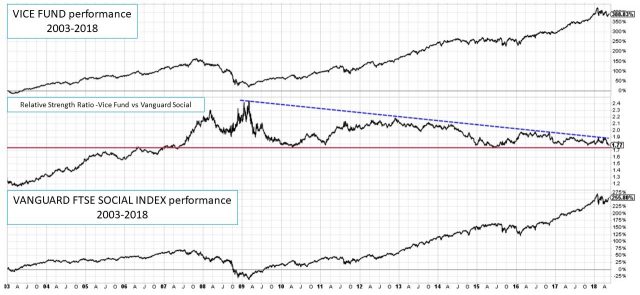Sustainable finance and vice stocks

On November 9th, 2016, the day Donald Trump became president, some American states voted to legalize cannabis. The next day, according to that referendum, California became the world’s largest market for cannabis use. In this period, the Canadian government is working to craft legislation to legalise recreational marijuana by summer 2018, a move that would fulfill a campaign promise by the prime minister, Justin Trudeau.
Despite the fact that Trump himself is trying to weaken the liberalisation of soft drugs, several insiders have seen it as an epochal and multigenerational revolution, similar to the one that put an end to the ban on alcohol in 1933.
In the past year, anyone who had invested in a passive fund such as the Horizons Marijuana Life Sciences Index ETF, listed on the Toronto Stock Exchange, which holds a basket of North American companies with significant activities in the marijuana industry, would have today, after a speculative peak that brought the price to +140%, just over +65%, compared to +12% achieved by the American S&P 500 index in the same period.

However, alcohol and drugs are considered by many people to be an unethical way of investing. Recently, an increasing number of investors are interested in the phenomenon of sustainable finance, born about a decade ago with the intent to promote a reality capable of changing (for the better) the world, shifting resources towards responsible activities towards the Planet and people.
Therefore, all those companies that make profits from unethical activities, such as those related to human vices like alcohol, drugs, gambling, tobacco and weapons, are excluded from sustainable investment. In short, what insiders define as “sin stocks” or ” vice stocks”.
However, it is little known that there are various academic studies that prove that the profitability of financial investments is due precisely to the presence of this type of security in investment portfolios (see, for example, “Sin Stock Returns”, Frank J. Fabozzi, K.C. Ma and Becky J. Oliphant, The Journal of Portfolio Management – Fall 2008).
Let’s compare the performance of two opposing funds: the Vice Fund (renamed Barrier Fund) and the Vanguard FTSE Social Index Fund. Both are US investment funds launched in the early 2000s. The first is aimed at companies considered socially questionable, namely those operating in the tobacco, alcohol and gambling sectors and in the defence and aerospace industries. The second consists of shares in companies that have been selected on the basis of social, environmental and human rights criteria.
Data collected since 2003 shows that the Vice Fund has performed better and emerged as the winner (+388%). The Social Index Fund also grew, but at a lower rate (+255%).

However, if we look at the relative strength ratio between the two funds, we see that since the start of the new bull market in 2009, things have changed. In fact, if we reconstruct the graph from that date, the accumulated performances are in favour of the Vanguard FTSE Social Index Fund (+305%) compared to the lower result of the Vice Fund (+232%).

But a review of the components of individual funds, provides us with two important information. The first is that in the social fund there is a 28% weight of the technology sector, with stocks such as Apple, Microsoft, Alphabet and Facebook. These securities are known to have outperformed the rest of the market and therefore the index has grown more for technical reasons than for reasons correlated to stock selection linked to ethical rating criteria.
The second piece of information, which has to do with more recent data, concerns the poor performance of companies linked to the world of tobacco. The Vice Index includes British American Tobacco, Philips Morris, Japan Tobacco and Altria Group, all with performances around -20% since the beginning of the year.
The main reason for these poor results seems to be that as more health-conscious consumers abandon traditional cigarettes, Big Tobacco has turned to ecigarettes, vaping and substitute devices in search of growth. However, recent results raised alarm bells over the strategy after a weak showing in markets such as Japan, which had been among Philip Morris’s most promising prospects.
Time will tell us if this is a moment of weakness of the Vice stocks, and therefore an interesting point to consider a purchase for the investors not very interested in the ethical values, or the beginning of the revenge of the sustainable finance.

Mario Valentino GUFFANTI CFTe – SAMT Vice President – Swiss Italian Chapter – mario.guffanti@samt-org.ch
Disclaimer: the above article is for general information and educational purposes only. It is not intended to be investment advice. Seek a duly licensed professional for investment advice.

